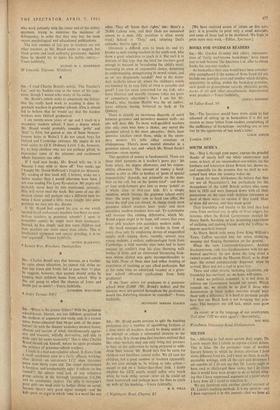SOUTH AFRICA .
SIR,—May I, through your paper, express the grateful thanks of nearly half my white countrymen and some, at least, of our unconsulted non-whites. for the . kindness and toleration Great Britain has shown us, and especially for the promise that we shall be wel- comed back when oair country wakes up.
I speak for many Afrikaners (do believe that they are not all Nationalists!), but particularly for the descendants of the 4,000 British settlers who came here in 1820 and were dumped down with all their possessions on the open veld—helpless townsmen as most of them were—to survive if they could. Most of them did survive, and they made good.
Their friendship and loyalty to the land they had come from survived too, in spite of bitter angers, for instance, when the British Government recalled Sir Harry Smith, breaking up his promising .experiment of civilising and making friends with the 'Caffres,' to impose apartheid instead.
As Harry Smith rode away from King William's Town, Caffres escorted him for miles, shrieking, weeping and flinging themselves on the ground.
When the new Lieutenant-Governor, Andries Stockenstroom, rode into Grahamstown with his un- wanted apartheid, he saw down. the long street a (white) crowd outside the Phoenix Hotel; as he drew near, the crowd conspicuously dispersed; when he arrived, there was not a soul to greet him.
These and other strains, including Gladstone, our friendship has survived; so. we hope. will yours. I make no political comment. It is not done to criticise our Government beyond our coasts. Which reminds me, we should be so glad if those who demonstrate in black sashes overseas would wear them with a difference. It is hard to persuade people here that our Black Sash is not breaking that prin- ciple. This hampers our stiff task, which must grow stiffer.
A u revoir; or in the language of our countrymen, 'Tod siene' ('till we meet again').—Sorrowfully,
MAY BELL
oodliiirst , University Road, Grahamstown






































 Previous page
Previous page